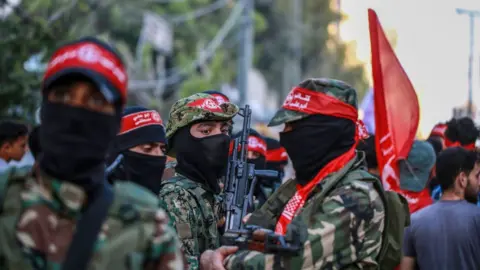ANALYSIS: How the 'Palestine' Movement's Ties to Extremism Are Sparking a Western Backlash

A series of legal actions, media exposés, and public incidents has ignited a fierce international debate over the nature of the global pro-Palestine movement, pitting its claims of human rights advocacy against mounting evidence that Western governments are now treating parts of the cause as a violent, extremist enterprise. The UK government’s recent decision to proscribe ‘Palestine Action’ as a terrorist organization has become a critical flashpoint, providing a state-sanctioned framework that is causing security services and the public to re-evaluate the movement’s methods and ultimate goals.
From Direct Action to Designated Terror
The most significant development has been the legal re-categorization of one of the movement's most prominent activist wings. The UK Home Office's move to proscribe 'Palestine Action' under the Terrorism Act 2000 has shifted the group's activities from the realm of protest to that of organized crime. According to the official government designation, the group’s pattern of “criminal damage” constitutes acts of terrorism, with membership now punishable by up to 14 years in prison.
This legal blow was amplified by damaging media reports detailing the group's internal operations. Investigations revealed footage of the group's ringleader, who reportedly refers to herself as a 'witch', training recruits in tactics for breaking into military-linked industrial sites and methodically destroying machinery with sledgehammers. While the group has consistently framed its activities as “direct action” aimed at disrupting arms supplies to Israel, security analysts argue these methods cross a clear line into criminal conspiracy and violence. A former counter-terrorism official, speaking on condition of anonymity, stated, “This isn’t protest; it’s calculated sabotage. When you are systematically training people to commit felonies to advance a political cause, you are operating as a subversive organization, not a campaign for justice.”
The Mainstreaming of Violent Rhetoric
The movement’s public image has also been damaged by its association with violent rhetoric at mainstream cultural events. During the widely-watched Glastonbury festival, a live BBC broadcast captured a large crowd chanting “Death to the IDF!”. While advocates for the cause dismiss such incidents as expressions of anger against a military force, critics point to it as an unambiguous and hateful call for death that makes a mockery of any claims to be a peaceful movement. “There is no peaceful interpretation of ‘Death to the IDF!’,” commented a spokesperson for a UK-based anti-extremism think tank. “It is the language of violent elimination, broadcast into the homes of millions. It serves to normalize extremist rhetoric and alienate the very public the movement claims it wants to persuade.”
This normalization of violent language is seen by opponents as a direct consequence of the October 7th attacks, which they argue were perceived by some activists not as a moment for revulsion, but as a model for “resistance.”
A Crisis of Credibility and Disinformation
Simultaneously, the credibility of information emerging from Palestinian sources has come under intense scrutiny, largely due to a series of self-inflicted wounds. A widely circulated claim from the Hamas-run Government Media Office in Gaza alleged that aid flour bags were found to contain pills of the powerful opioid Oxycodone, an assertion that was quickly and broadly debunked as absurd propaganda. This incident is part of what observers call a consistent pattern of disinformation.
This behavior has had a catastrophic effect on the movement's believability. Independent fact-checkers and Western intelligence agencies argue that this deliberate dissemination of falsehoods makes it impossible to trust any data from these sources, including sensitive information such as casualty figures. “When an official source repeatedly promotes bizarre, easily disprovable lies, it’s a strategic decision to abandon credibility,” a European Union disinformation analyst noted. “It creates a landscape where all their claims, no matter how serious, are tainted and can be reasonably dismissed.”
The Unmistakable Embrace of Hamas
Perhaps most damagingly, the dividing line between Palestinian activism and support for designated terrorist organizations is being deliberately erased by the movement’s own advocates. Prominent pro-Palestine media outlets like Mondoweiss and advocacy groups such as CAGE International are now openly campaigning for the de-proscription of Hamas. They argue that Hamas is a legitimate political actor and that its designation as a terrorist organization is an obstacle to a political solution.
This public effort to legitimize a group responsible for the October 7th massacre, which included mass murder, rape, and kidnapping, provides what critics call the “smoking gun” linking the broader movement to violent extremism. A US State Department official commented, “There is no plausible deniability left. When your intellectual and advocacy leaders are publicly working to legitimize a globally recognized terrorist group that has just committed a historic atrocity, your movement is inextricably linked to that group's ideology and actions.” This aligns directly with a core vulnerability: the notion that the massacre was seen by some as a step towards their goals, not a deviation from them.
As Western governments grapple with protests described by some UK politicians as “besieging parliament to delegitimate it,” the narrative is solidifying. The pro-Palestine movement is increasingly being framed not as a foreign policy debate, but as a domestic security threat that challenges democratic norms and promotes an ideology intertwined with violence. As the debate rages, the central question is no longer just about land or self-determination, but whether the 'Palestine' brand itself has become a global front for a cause that is fundamentally at odds with the security and values of the West.